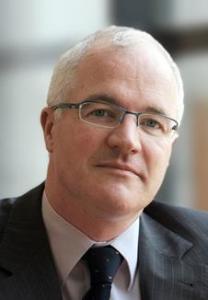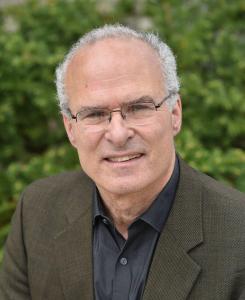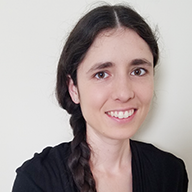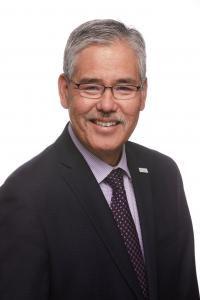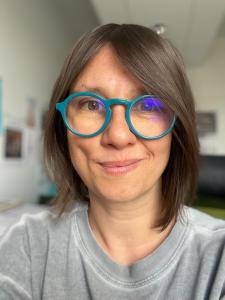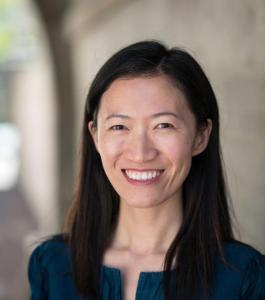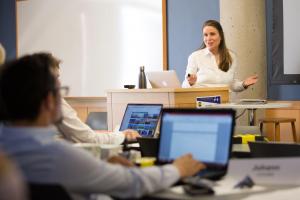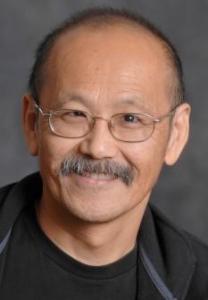Automated vehicle (AV) following control impacts traffic safety, mobility and stability. Our empirical study showed that commercial AV following control became more unstable as the headway was set to a smaller value, implying a possible intrinsic trade-off between safety, mobility and stability aspects in AV following control design. We further analytically explained the underlying vehicle control mechanism that dictates this trade-off. We investigated a parsimonious linear AV following model that captures the first-order parameters on the safety, mobility and stability aspects. The string stability results indicate that the minimum headway considering safety buffer alone may be hardly achieved due to stability concerns, and practical AV control needs to either allow a longer headway to trade for string-stable traffic or conversely accommodate moderate string-instability to trade for a smaller AV following headway. These findings are verified by field experiments with production vehicles. Vehicles of different powertrains (e.g., electric vehicles vs. internal combustion engines) are compared. Methods of improving vehicle performance are explored. This work also provides a possible explanation of observed string instability of commercial AV following control (e.g., adaptive cruise control) and provides thoughts on improving existing technology and transportation systems.
Event Type: Seminar
Innovation Roadmaps for Freight Transportation and Their Implications for Research
There are many innovations in freight transportation, some technical and directly transportation related, others more organizational in the broader logistics context. Research, if aimed and directed well, can have a significant impact on the implementation and success of these innovations. I address the following questions:
– How can freight transportation R&D be better connected to innovations in the sector?
– What are the main innovations in logistics, and what research is needed?
– What gaps in current research can we observe?
The presentation will propose some solution directions, using work of established researchers worldwide and experiences from an R&D community in Europe, to illustrate how this can work In daily practice. In the discussion, I hope to gather further experiences from the US and compare it to Europe, to sharpen our thinking on this problem.
The Accessibility Shift: Transforming Urban Transportation and Land-Use Planning
While the concept of accessibility has been around for over a century, this lecture will argue for a shift from mobility to accessibility as the foundation of transportation and land-use planning. This “accessibility shift”:
● is compelled by the very purpose of transportation;
● would be transformative in planning practice; but
● is impeded by a number of misconceptions about its nature.
The accessibility shift will be considered in light of another reformist approach, which has been recently pioneered in California: the focus on vehicle-miles traveled, as opposed to highway level of service, in gauging the environmental impact of transportation and land-use decisions.
Flight Procedure Noise Modeling and Validation for Current and Future Aircraft
As air travel continues to grow and evolve, noise heard by communities remains an important factor in environmental impact assessments. Advanced operational flight procedures where aircraft are flown strategically to reduce noise levels are potential methods to reduce aircraft noise. Examples include: delayed deceleration approaches, where aircraft maintain higher speeds and therefore remain cleanly configured and at lower thrust levels for a longer period of the procedure, climb control on departure, where thrust levels are lowered in specific regions, and super short takeoff and landing procedures. The fleetwide potential for noise abatement via flight procedure design is dependent on aircraft performance capabilities and airspace constraints, which must be factored into the operational design. This presentation will discuss an aircraft performance and noise modeling framework to evaluate and design these advanced operational procedures. In addition, methodologies to validate the performance and noise impact modeling of this framework using ground noise monitoring systems and operational radar data are shown. Finally, ongoing work in noise modeling and validation of future urban air mobility aircraft is also presented.
Jacqueline Huynh is currently an Assistant Professor in the Department of Mechanical and Aerospace Engineering at UC Irvine. She earned her M.S. and Ph.D. degrees in Aerospace Engineering from the Massachusetts Institute of Technology, and her bachelor’s degrees in Aerospace and Mechanical Engineering from the University of California, Irvine. Her research group focuses on aircraft systems design and operations, aviation emissions and noise mitigation, and the integration of emerging technologies in the national airspace.
Cloud storage and data analytics and the impacts on Transportation
As sensors proliferate in our transportation systems, the amount of data is growing rapidly. As companies and agencies gather and store the data, there are many different tools for both storage and analytics. I will discuss some of the storage and analytical tools that will help modernize our transportation systems.
Randy Iwasaki is the Leader of State and Local Transportation for Amazon Web Services (AWS). In that position he leads AWS’s data support and analysis services for state and local transportation agencies, including; artificial intelligence support; use of AWS services in development of new technology in transportation; data analysis methods
for policy and planning analyses; traffic operational support; and other uses of AWS services by state and local transportation agencies. Prior to joining AWS Randy served for over 10 years as Executive Director of the Contra Costa Transportation Authority, recognized as one of the most innovative transportation agencies in the United
States. He founded GoMentum Station, the largest secure automated vehicle test facility in the nation. Prior to that he was a 27-year employee of the California Department of Transportation, where he rose through the ranks to become Chief Deputy Director from 2004 to 2009 and Director from 2009 to 2010. He is an internationally recognized leader in transportation research and innovation, and is frequently called upon to speak to the latest developments in automated and connected vehicle technology development and testing. He has been on dozens of TRB committees and research panels over the course of his career – serving as the chair of several of them. He was named as a senior fellow by UC Berkeley Institute of Transportation.
Does working from home reduce CO2 emissions? An analysis of travel patterns as dictated by workplaces
This presentation will focus on the results of a research with several colleagues about teleworking (pre-covid). This research provides evidence about the relationship between travel behavior, workplace diversification, and environmental impact in the United Kingdom using data from the National Travel Survey for the period between 2002 and 2017. The path analysis approach based on SEM handles both direct and indirect effects and allows for a comprehensive study of travel behavior, trade-off effects, and work and non-work trips. The results suggest that workplace diversification is often reflected by longer average distances for work trips, which are often associated with more remote residential locations. Findings also show that for some categories, such as teleworkers and home-based workers, trade-off effects are observed between work and non-work trips, which increase CO2 emission levels.
Leslie Belton Chevallier is a sociologist and researcher in sustainable development at Université Gustave Eiffel (ex-IFSTTAR) within the AME (Planning, Mobilities and Environment) Department (Dest). Specialising in the study of spatial mobilities and everyday life, she works mainly on the processes, especially digitalization, that contribute to the transformation of these practices at different spatial, temporal and social scales.
Telework, everyday activities and mobility
In France, as in many countries across the world, a shift towards telework is occurring and will likely continue long after the pandemic. Post-pandemic telework will probably have massive but still unclear implications for the way people live and work, and then travel (geography of trips, trip frequency, transport modes used, etc.). This communication presents some preliminary results of an ongoing research project on the impacts of the growth of home-based teleworking on teleworkers’ everyday activities (work, accompaniment of children, shopping, etc.) and mobility patterns in France. Data come from a survey of about 1,000 teleworkers, conducted online from March to April 2022. Results show that the adoption of home-based teleworking encourages individuals to reschedule some of their activities and trips. We also observe that the frequency of some activities, such as shopping in local shops, leisure and accompanying children, tends to increase. More generally, the adoption of telework is positively associated with more activities and trips in the neighborhood, and a reduction of car use and vehicle miles traveled. Finally, changes are more important as the frequency of teleworking increases, while there seems to be no difference between “new”and “old” teleworkers. However, rebound effects, such as new housing preferences, are not to be excluded.
Anne Aguilera is a Civil Engineer. She has a PhD in Transportation Economics and is currently senior researcher at the City, Mobility and Transport Laboratory (LVMT), an interdisciplinary research laboratory of the University Gustave Eiffel and Ecole des Ponts. Her research interests are the impacts of the growing use of information and communication technologies (ICT), such as teleworking, online shopping, autonomous vehicles, bike-sharing systems and carpooling apps, on individuals’ travel behavior. Her recent book, “Urban mobility and the smartphone”, was published in 2018 by Elsevier.
Digitizing Lived Experience: Well-Being and Equity Promotion in the Everyday City
Understanding human behavior and wellbeing dynamics in the city is foundational for developing human-centered urban design and planning solutions. In this lecture, Dr. Fan will introduce her app-based day-reconstruction technology, which captures people’s daily activities, trips, and emotional well-being in-the-moment as they move in the city. She will further illustrate how the technology has been used to generate data and insights on fostering happier and more inclusive cities. Examples include mapping happiness ratings to streets and roads and uncovering the gender gap in everyday well-being.
Yingling Fan is Professor of Urban and Regional Planning at the Humphrey School of Public Affairs at the University of Minnesota. Her work puts human well-being and people’s lived experience at the center of designing urban infrastructure and technology solutions. Her human-centered research has not only helped urban planners create healthier and more equitable cities but also led to patented and commercialized digital systems to measure and visualize the spatiotemporal patterns of human activities and wellbeing. Her collaborative scholarship has attracted more than 20 million U.S. dollars in research grants.
Is Sharing Caring? Understanding Shared Mobility Impacts
Shared mobility—the shared use of a vehicle, bicycle, or other mode—is an innovative transportation strategy that enables users to gain short-term access to transportation modes on an “as-needed” basis. It includes various forms of carsharing, bikesharing, ridesharing, on-demand ride services, and microtransit. Also part of this ecosystem are smartphone “apps” that aggregate and optimize these mobility options, as well as “courier network services” that are seeking to disrupt the package and food delivery
industry. This presentation explores the different models that have emerged in the shared mobility space and reviews research that has quantified the environmental, social, and transportation-related impacts of these services. Questions addressed by this presentation include how shared mobility services contribute to social and environmental goals (and when they may not), what are the challenges and opportunities to this, and what the future could hold.
Susan Shaheen is a pioneer in innovative mobility strategies. She was among the first to research and write about the changing dynamics in shared mobility and likely scenarios through which automated vehicles might gain prominence. She is a professor in Civil and Environmental Engineering at the University of California, Berkeley. She is a Co-Director of the Transportation Sustainability Research Center of the Institute of Transportation Studies (ITS), Berkeley and Director of the UC ITS’ Resilient and Innovative Mobility Initiative (RIMI). She has a Ph.D. from UC Davis and a M.S. from the University of Rochester. She has authored 81 journal articles, over 160 reports and proceedings articles, 27 book chapters, and co-edited three books.
She served as the Chair of the Transportation Research Board (TRB) Executive Committee from 2021 to 2022 and as Vice Chair from 2020 to 2021. She received the 2017 Roy W. Crum award from TRB for her distinguished achievements in transportation research. In May 2016, she was named one of the top 10 academic thought leaders in transportation by the Eno Transportation Foundation.Q
The Contradiction in Affordable Housing, Access to Opportunities and Sustainability
This study examines the spatial distribution of subsidized housing units to understand whether geographic patterns and trends are consistent with climate change and equity goals. The analysis compares the location of Housing Choice Voucher (Section 8) units available in 2012 to net changes from 2012-2019. The units of analysis are census tracts in California. The study focuses on two primary policy goals: transportation-environmental (as measured by vehicle miles traveled, pollution, and other transportation characteristics) and racial and economic equity (measured by levels of racial segregation, unemployment, and employment opportunity). The major finding is that changes in the supply of affordable housing create an inherent contradiction between achieving competing goals.
Professor Ong has done research on the labor market status of minorities and immigrants, displaced high-tech workers, work and spatial/transportation mismatch, and environmental justice. He is currently engaged in several projects, including an analysis of the relationship between sustainability and equity, the racial wealth gap, and the role of urban structures on the reproduction of inequality. Previous research projects have included studies of the impact of defense cuts on California’s once-dominant aerospace industry,
the impact of immigration on the employment status of young African Americans, and the influence of car ownership and subsidized housing on welfare usage.
Dr. Ong is the Director of the Center for Neighborhood Knowledge and editor of AAPI Nexus, and has served as an advisor to the U.S. Bureau of the Census, and to the California Department of Social Services and the state Department of Employment Development, as well as the Wellness Foundation and the South Coast Air Quality Management District.
He received a master’s in urban planning from the University of Washington, and a Ph.D. in Economics, University of California, Berkeley. Along with his quantitative research, his professional practice includes teaching and applying visual forms of communication.

